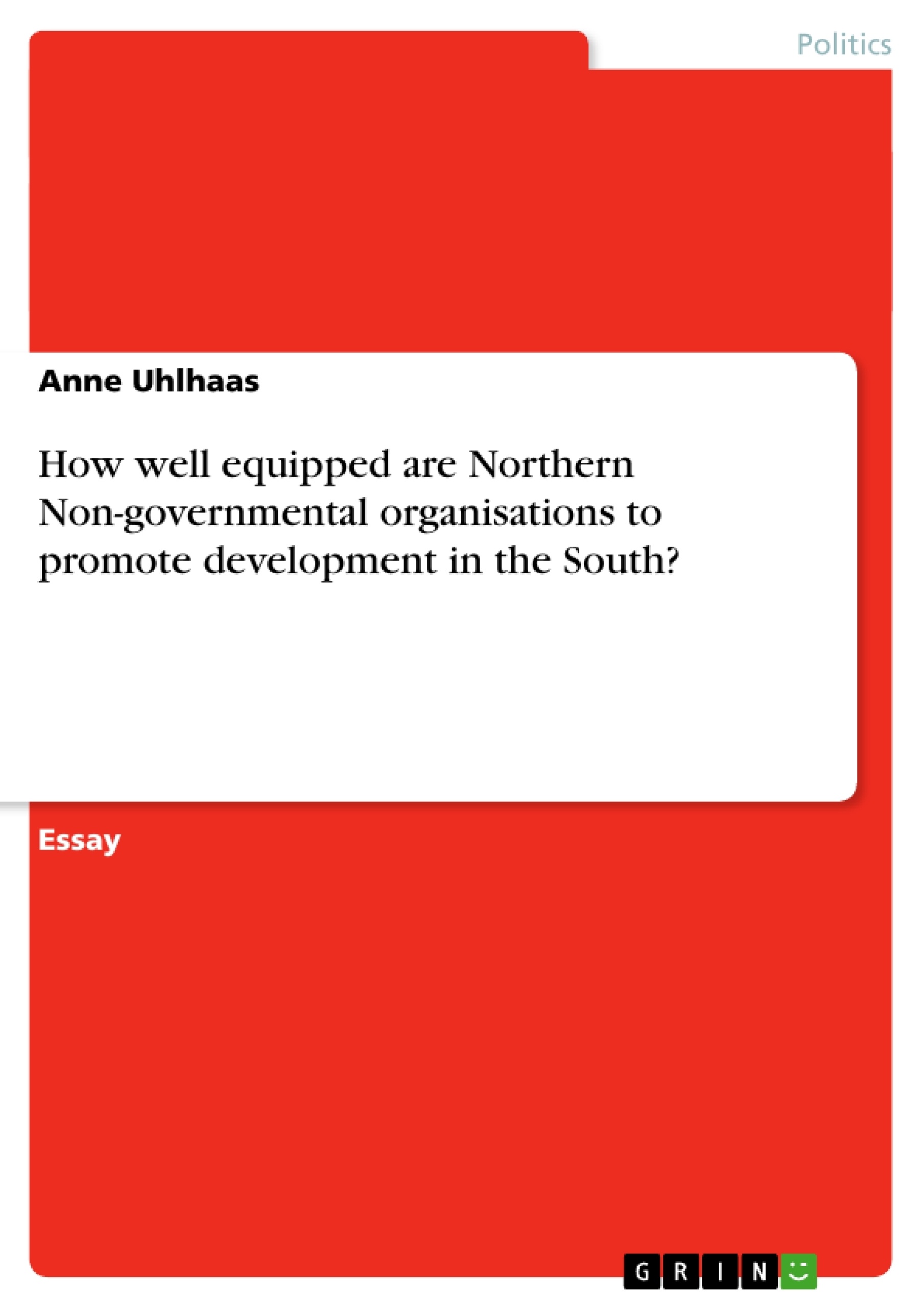Two decades ago governmental development policy came into a crises and was criticised to have no results on poverty reduction. Hence, Northern NGOs were said to be the best alternative to developmental help through governments and their number dramatically increased (Warkentin, 2001, p. 5). However, today NGOs are confronted with a new “global policy agenda” (Fowler, 1997, p. XIV). As developmental issues have changed a lot in recent times, Northern NGOs themselves have to face an identity crises and are seen in a much more critical way than before. Therefore questions arose, regarding whether or not Northern NGOs can really come up to expectations, and if they are able to cope with developmental issues better than governmental organisations. In other words: How well equipped are Northern NGOs to promote development in the South?
In this essay it will be argued that NGOs still form an effective part of developmental work in the South which cannot be missed. They still have an advantage compared to governmental organisations although some advantages, which were said to exist, never existed in reality. Nevertheless, while NGOs had to undergo extreme changes in structure and aims, they lost a lot of their characteristics, which were of basic importance for their special possibility to do a better work in the South than governmental organisations. Hence, if they are not able to stop this process of loosing their roots they become interchangeable, and therefore loose their legitimacy. Thus, they have to adapt new skills, create new networks and, particularly, have to revert back to their roots which make them so special and effective.
To answer the question I first want to work out the characteristics, backgrounds and structures of Northern NGOs. In looking at their possibilities and limits, I want to discuss the question of whether the common belief in comparative advantages of NGOs can be proved or not. I will then refer to the new challenge of networking that they have to cope with in our times, especially the rise of Southern NGOs. Finally, I want to sum up my results and try to find possibilities and solutions of adapting new methods of co-operation with Northern and Southern NGOs, which Northern NGOs should pick up to make sure that they will still play an important role in the future of developmental policy.
Inhaltsverzeichnis (Table of Contents)
- Introduction
- The discussion
- The comparative advantage of Northern NGOs: Does it exist in reality?
- Facing the problems of networking: How to create North-Northern and North-Southern relationships
- Conclusion
Zielsetzung und Themenschwerpunkte (Objectives and Key Themes)
This essay aims to evaluate the effectiveness of Northern NGOs in promoting development in the South, considering the changing global landscape and the emergence of new challenges. It explores the question of whether Northern NGOs possess a genuine comparative advantage over governmental organisations and examines the impact of growing professionalism and dependency on donors.
- Comparative advantage of Northern NGOs: Does it truly exist?
- Impact of growing professionalism and bureaucratization on NGO effectiveness.
- The importance of networking and building strong relationships with both Northern and Southern NGOs.
- Balancing the need for funding with maintaining independence and focusing on long-term development.
- The role of participation and self-help in development initiatives.
Zusammenfassung der Kapitel (Chapter Summaries)
The introduction sets the context for the discussion, highlighting the growing importance of Northern NGOs in development work and the changing nature of the global policy agenda. It outlines the central question of the essay: how well equipped are Northern NGOs to promote development in the South?
The discussion begins by examining the alleged comparative advantage of Northern NGOs. It explores the characteristics of NGOs, including their position within civil society and their reliance on voluntary work and solidarity. It then analyzes key arguments concerning the advantages and disadvantages of Northern NGOs compared to governmental organisations, including their direct links to society, their independence from government influence, and their flexibility.
Schlüsselwörter (Keywords)
Northern NGOs, Southern NGOs, development, comparative advantage, professionalism, networking, participation, self-help, donor dependency, governmental organisations, civil society, global policy agenda.
Frequently Asked Questions
Do Northern NGOs have a real advantage over governments?
The essay argues that while Northern NGOs are often seen as more effective due to their direct links to society, some perceived advantages may not exist in reality.
What is the "identity crisis" facing Northern NGOs today?
Increased professionalism and bureaucratization have led some NGOs to lose their roots, making them feel interchangeable with governmental organizations.
How does donor dependency affect NGO work?
Dependency on donors can compromise an NGO's independence and shift its focus toward short-term goals rather than long-term sustainable development.
Why is networking with Southern NGOs important?
Building strong relationships with local Southern NGOs is crucial for ensuring participation, self-help, and legitimacy in developmental projects.
What are the challenges of "professionalism" in NGOs?
While it improves efficiency, excessive professionalism can lead to a loss of the voluntary spirit and solidarity that originally defined NGOs.
- Quote paper
- Anne Uhlhaas (Author), 2001, How well equipped are Northern Non-governmental organisations to promote development in the South?, Munich, GRIN Verlag, https://www.grin.com/document/11519



